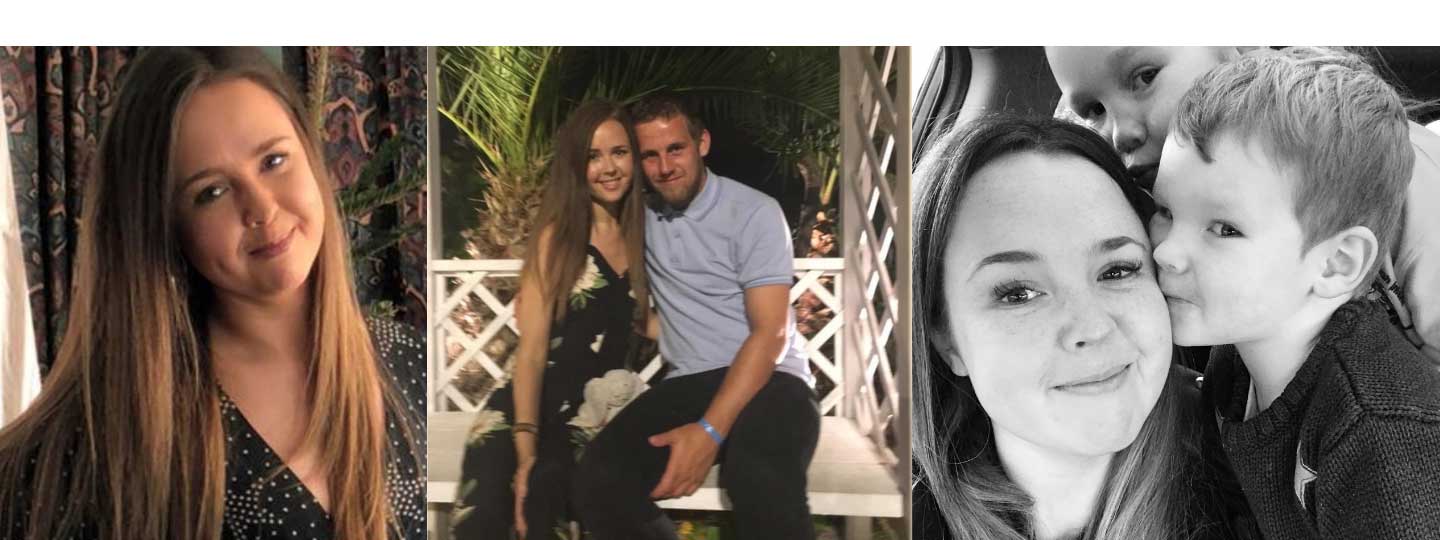Living in pain: my life with JIA
29 October 2020
Cat is 32, an A&E doctor, and mum of two. She was diagnosed with juvenile idiopathic arthritis at 14.
Cat has lived over half her life with arthritis, and although she’s never been pain-free, that’s not stopped her doing what she always wanted.
She started her blog, That Girl With Arthritis when she was younger, as she finds writing to be very therapeutic, and hopes that sharing her experiences helps people. Both people who don’t understand much about the condition and people who have it.
“It was such a relief to be diagnosed.”
I was poorly for about three or four months, but we didn’t know what was wrong. I couldn’t do anything for myself – I needed help with washing, dressing, feeding and even sometimes going to the toilet.
It was a relief to be told I have JIA, but also a relief to be believed.
“Children don’t always know how to voice their pain.”
Children don’t always know how to voice their pain, or if they’re feeling unwell. I was 14, so I could explain my symptoms to a certain extent, but that’s not always the case. We need a way to make this easier for kids.
I missed a lot of school and was often in pain whenever I did go in. It was a struggle that many teachers didn’t understand. They thought I was making it up, to avoid PE, for example. Thankfully most of my friends just accepted it and were keen to help.
“There is still a huge lack of understanding about what it is like to have JIA.”
As well as being in pain all the time, I’m often physically and mentally exhausted. It’s impossible to describe the pain, and the fatigue is so much more than just feeling ‘a bit tired’.
I’m generally good at coping day to day. I’ve had JIA for over half of my life now and can’t remember what it’s like to not be in pain. But it can feel relentless and sometimes it’s difficult to handle knowing that I have this condition forever.
“The pain was all-consuming. I was underweight and sleeping up to 15 hours per day.”
By the age of 20, I’d been experiencing hip pain for some time. I didn’t think much of it, but then, suddenly, I was told my hip needed replacing.
Before meeting me, my surgeon expected I’d be coming to the clinic in a wheelchair because of how severe the damage looked on my x-ray.
This was all happening as I started university. I didn’t have much of a social life, so it was difficult at first to make new friends. It was a really awful time. I had three months off university after the operation and, when I came back, people said I was a different person.
“Not being able to help people because of COVID-19 was really difficult to accept.”
I finished my studies and, today, I’m an A&E doctor.
My arthritis is very relevant at work because I take immunosuppressants, so I’m more susceptible to any infectious disease, including COVID-19. It means I wasn’t seeing patients face-to-face during the peak of the pandemic, which was hugely frustrating.
I returned to my normal patient-facing role in June 2020, so I’m back to doing eight to ten-hour shifts, sometimes six days in a row, which means my feet can get really sore.
Shift work also messes up my medication regime - I usually take some medication in the morning and then some at bedtime, but a night shift means I’m asleep in the day and can’t always stick to that schedule. Sometimes I have to take painkillers to get through it.
“I have never been pain-free.”
I’ve tried various treatments over the years. Currently I take steroids, NSAIDs, methotrexate and tocilizumab, and I’ve also had two joint replacement surgeries, the most recent one being my shoulder.
I would say my condition is fairly under control, but I’ve never been pain free.
I try not to let that stop me doing the job I love. It’s important to have a positive mental attitude – nothing can take the pain away, but I’m used to it to a certain extent. Things like work, hobbies, socialising – they are distractions if anything.
“You don’t have to be embarrassed or afraid to talk about it.”
Having JIA, or any other type of arthritis, doesn’t have to ruin your life or stop you achieving your goals. If anything, it makes me more determined to do things, especially when others expect me not to be able to.
About Juvenile Idiopathic Arthritis
Juvenile idiopathic arthritis (JIA) is inflammation (swelling) of one or more of your joints. It first occurs before your 16th birthday.
Cat’s JIA has stayed with her, but that’s not always the case.
There are different types of JIA and symptoms vary between the different types. Knowing which type you have helps assess the likelihood you'll grow out of JIA.
Check out our information on the condition to learn more.
Get the support you need
- If you would like to talk to someone, you can call our free helpline on 0800 5200 520 (Monday to Friday, 9am to 8pm)
- Talk to our arthritis virtual assistant, 24/7
- Join our online community
- Stay in touch and follow us on Twitter, Facebook and Instagram.